Intra-uterine insemination (IUI) also known as Artificial Insemination is a process in which the washed/processed semen is placed directly into the uterine cavity with the help of a thin sterile plastic tube (catheter) in and around the time of ovulation (release of egg from the ovary).
It is one of the simplest techniques of assisted reproductive technique (A.R.T.). It forms the first basic and the least invasive treatment technique for infertility management. This makes IUI treatment Mumbai a preferred choice for many couples seeking to begin their journey towards parenthood with a less invasive procedure with less IUI treatment cost.
The purpose of IUI treatment Mumbai (Artificial Insemination) is to introduce the best and the most motile sperms high up in the uterine cavity i.e. as close to the ovum as possible so that the distance that the sperms have to cover is the minimal and to overcome factors like cervical mucus opposition for its entry into the uterine cavity. Also as generally it is done with follicular monitoring, the egg is matured and released or about to be released. Hence we are sure that both the egg and sperm are timed properly for optimum fertilization and increased chances of pregnancy.
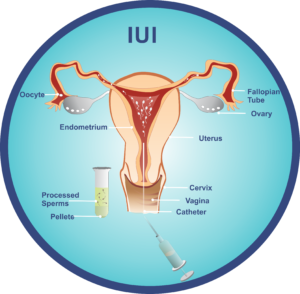
The success rate of IUI (Artificial Insemination) depends on a multitude of factors like women’s age, ovarian reserve, previous obstetric history and semen parameters and most importantly on stimulation protocol used.
IUI (Artificial Insemination) done in natural cycles has a success rate of 8-10%.
Stimulation done with oral medications (Clomiphene Citrate) increases the success rate to 14 – 15%.
Use of injectable Gonadotrophins increases the rate of success to 18 – 20%.
Using highly potent recombinant Gonadotrophinsfurther increases the success rate.
Addition of GnRh antagonist increases the pregnancy rates further by 26-30%.
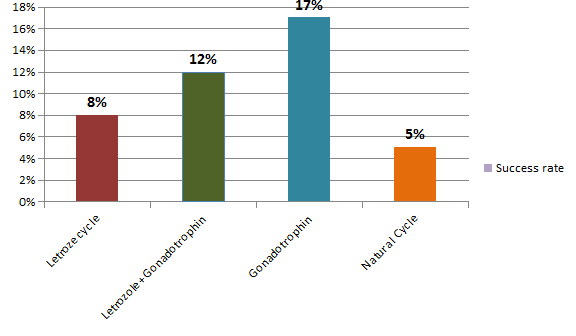
Endometrial evaluation – Gametes are like seeds and the endometrium (lining of uterus) is like the soil. Just as for proper implantation of seeds, good soil is necessary, so is the endometrium for the embryo. We routinely evaluate the thickness and pattern of endometrium so as to prepare an optimum endometrium and enhance the results. This is done with a series of ultrasounds at our clinic.
If found necessary, certain medications are given to increase the thickness, and a color doppler for blood flow to the endometrium is also done. If the blood flow is found deficient, a medical treatment is initiated along with constant evaluation of the same to increase the live birth rates and decrease the abortion rates.
Evaluation of male partner – We do semen analysis in our Lab, so as to pick up any subtle abnormalities which might be present inspite of normal count and motility.
Certain specialized tests like Sperm Function Test, DNA fragmentation rate and Mitochondrial assay are done in specialized circumstances so as to enhance the result.
Sperm function test gives an idea of the capacity of sperm to fertilise an egg.
DNA fragmentation rate gives an idea of genetically normal sperms. High fragmentation rate is associated with higher rates of abortion.

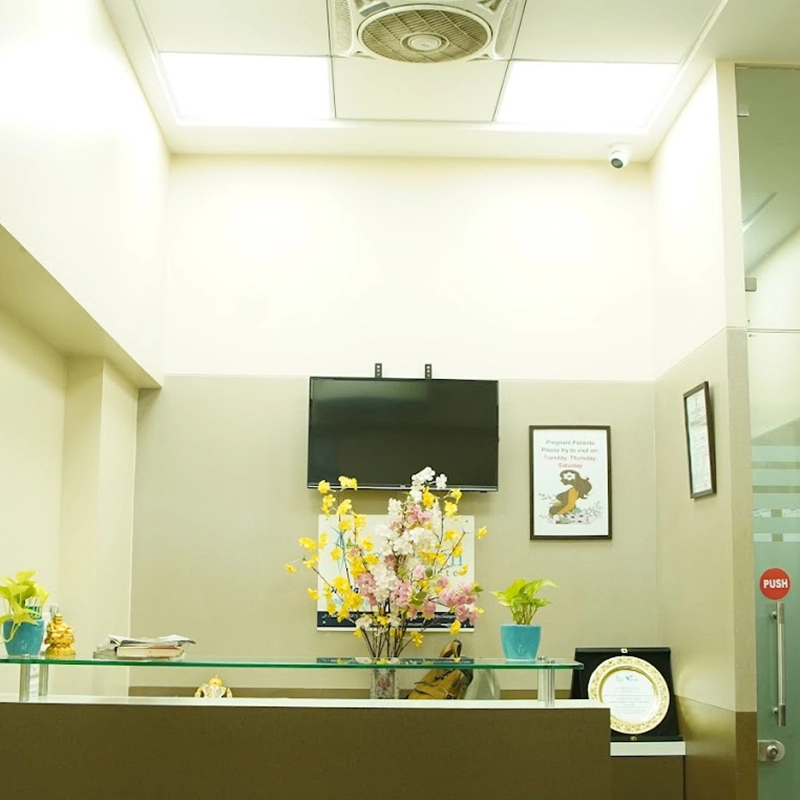
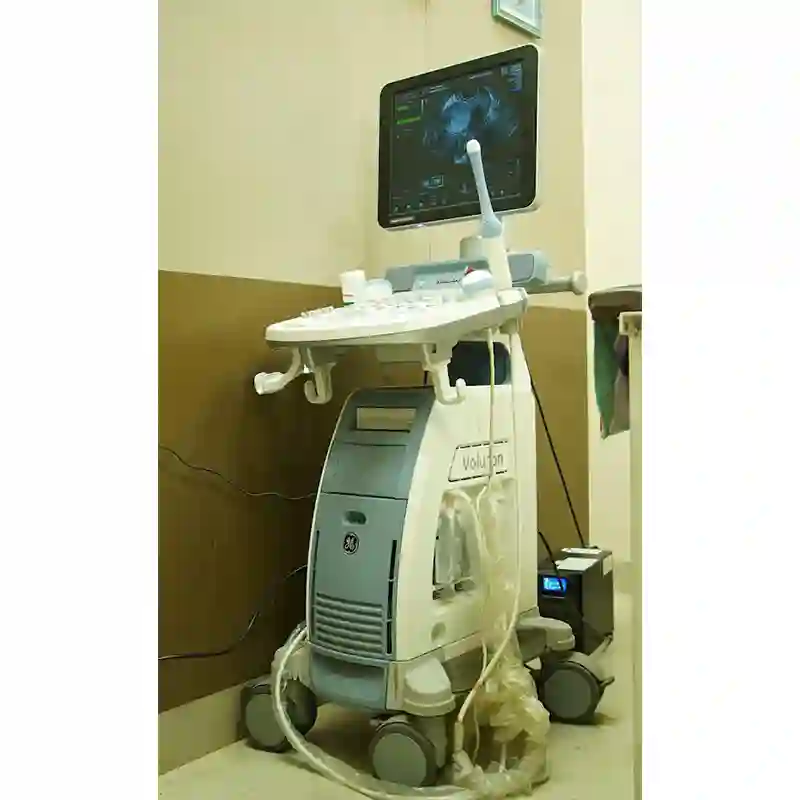
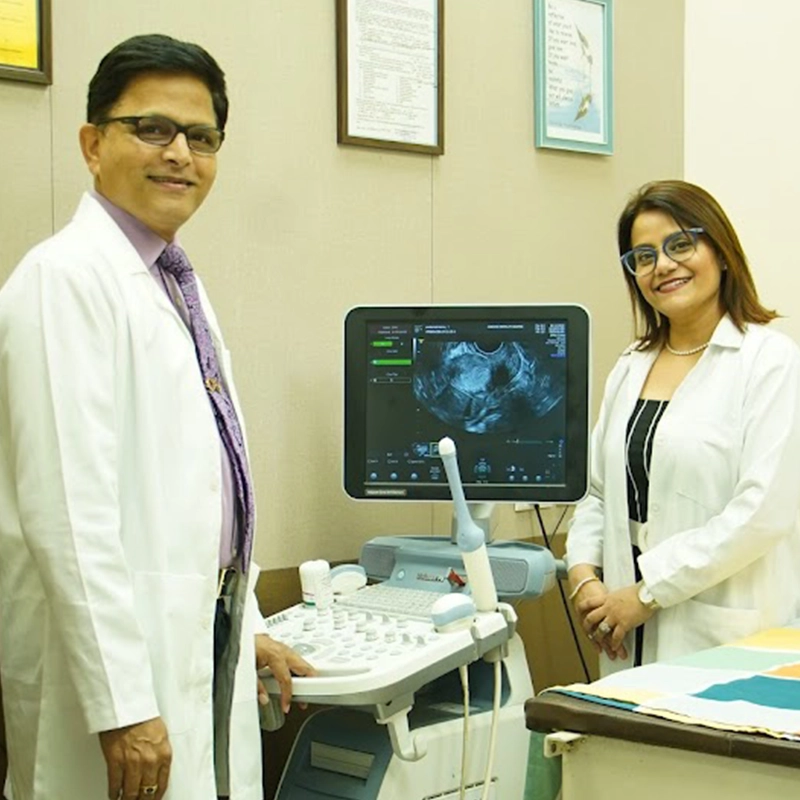
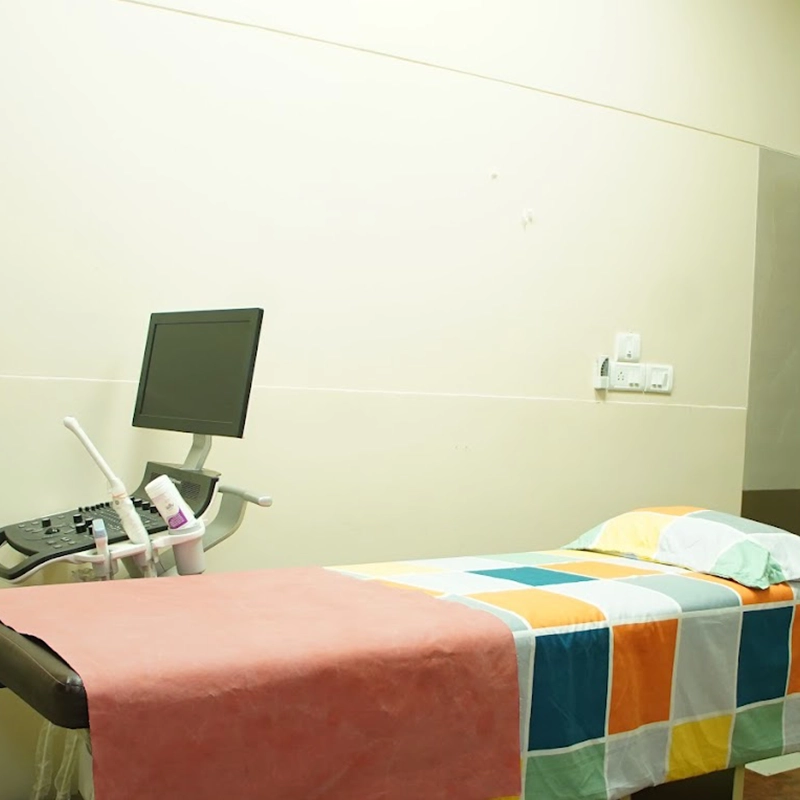
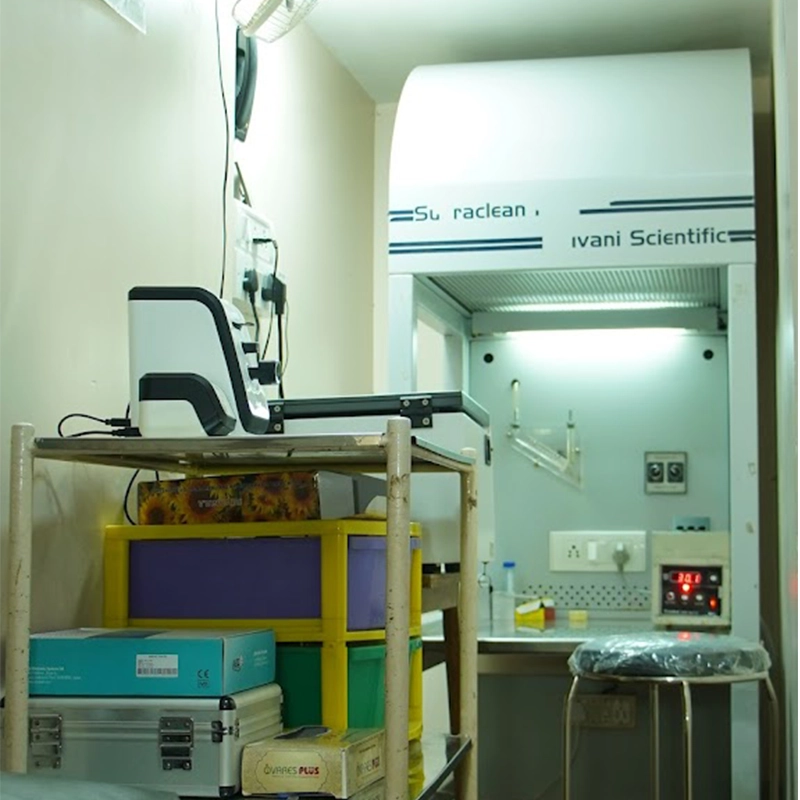
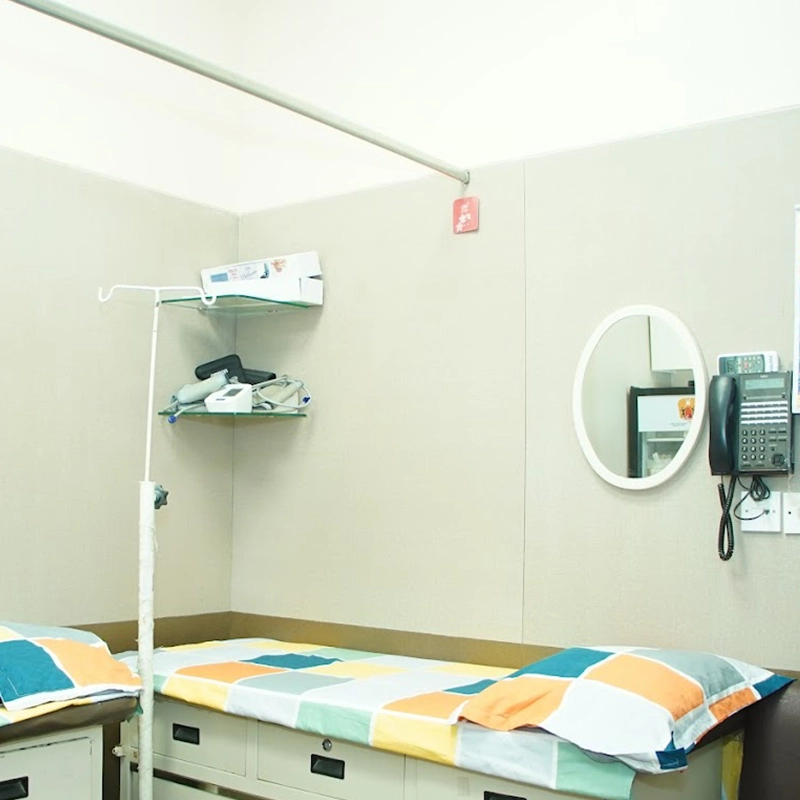
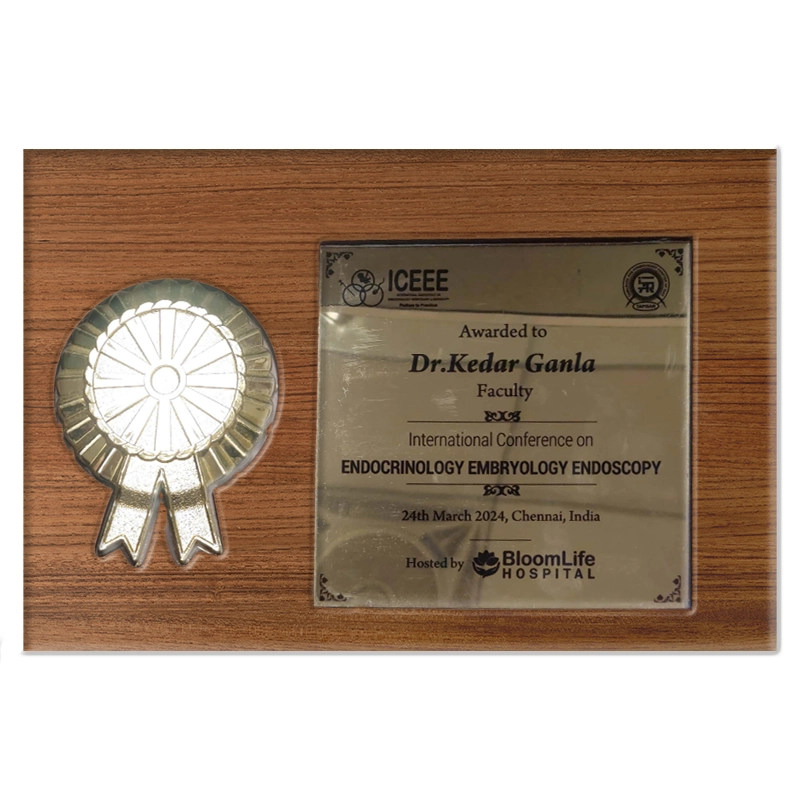
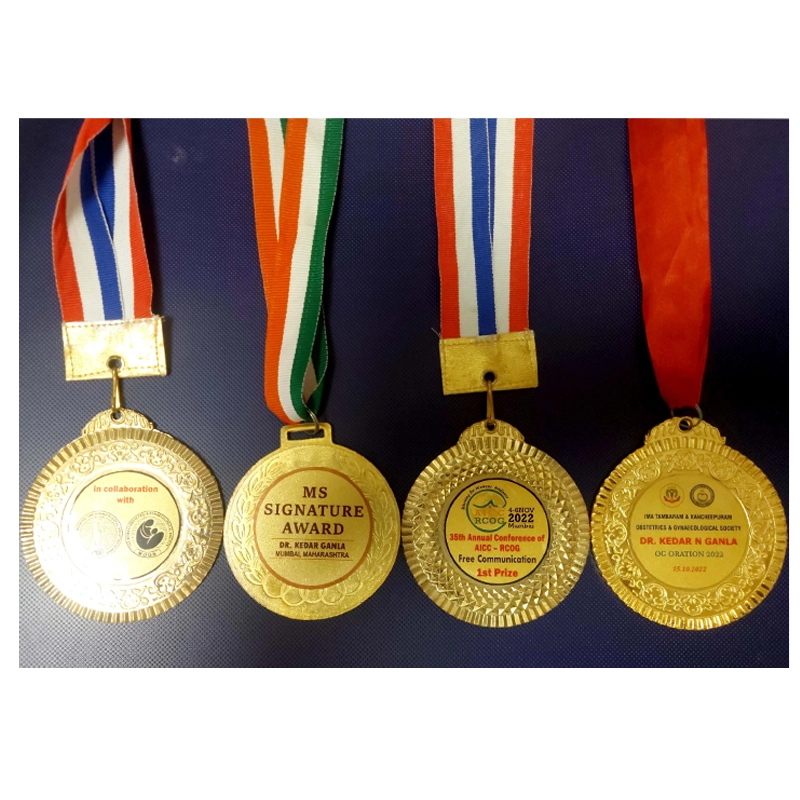

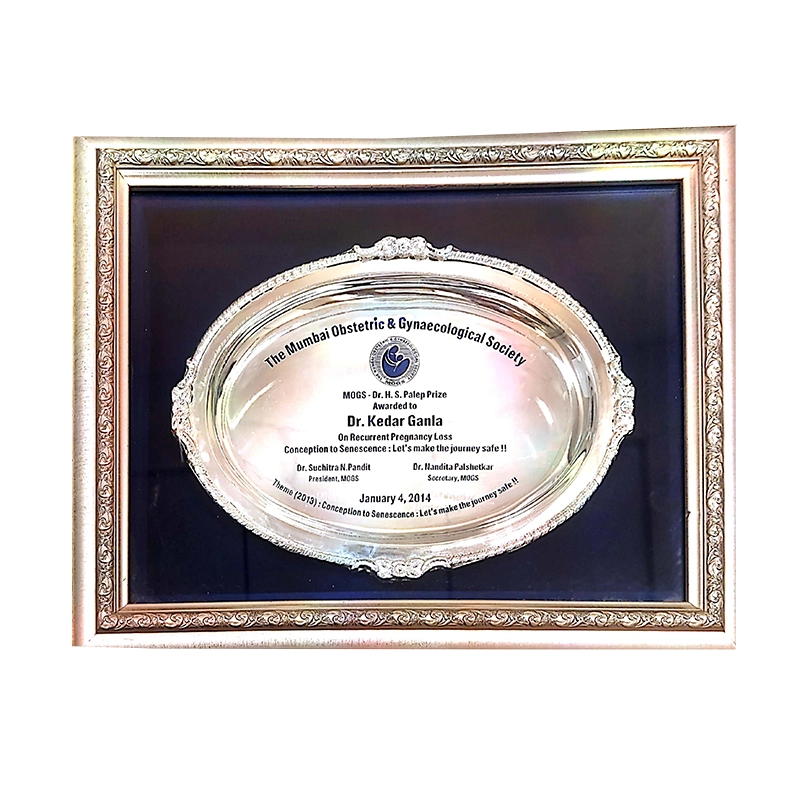
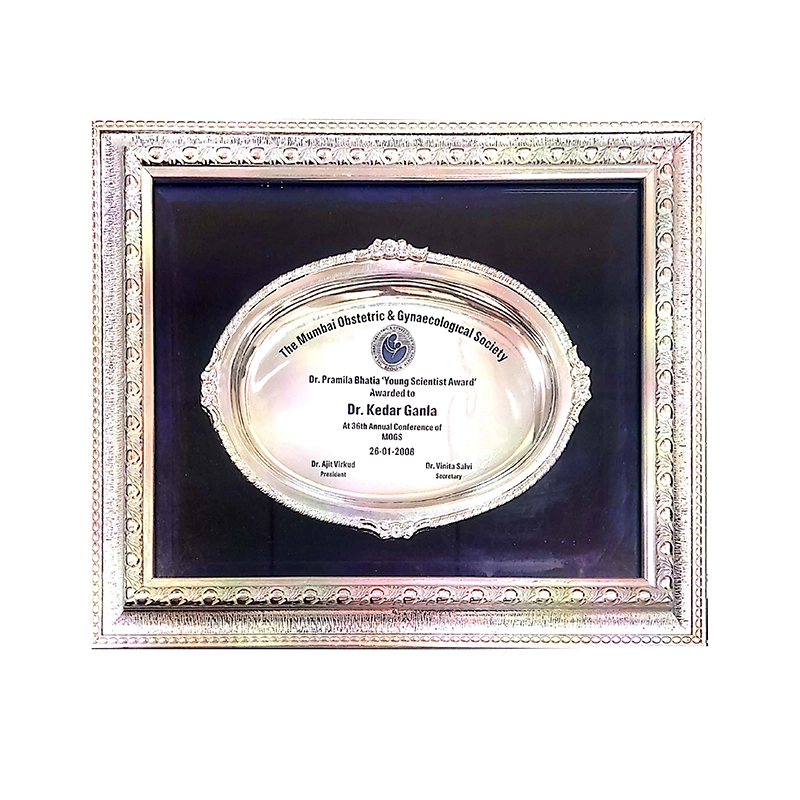
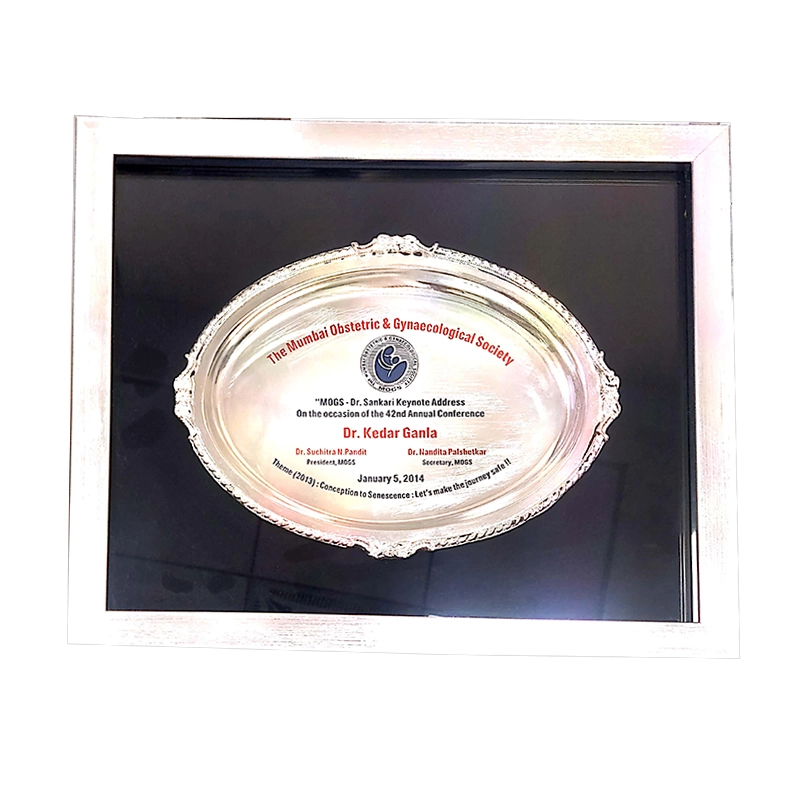
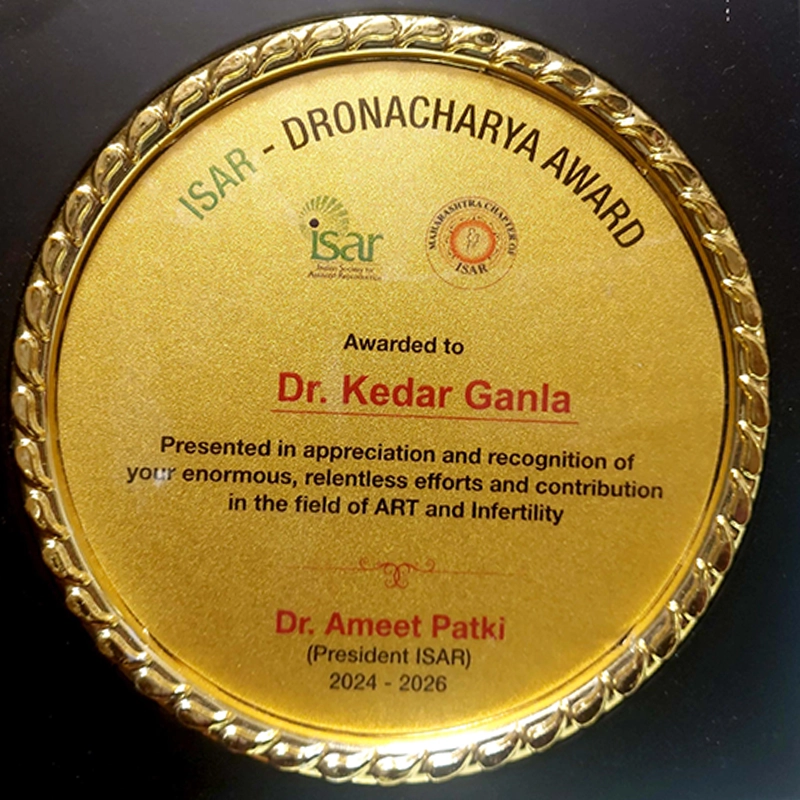
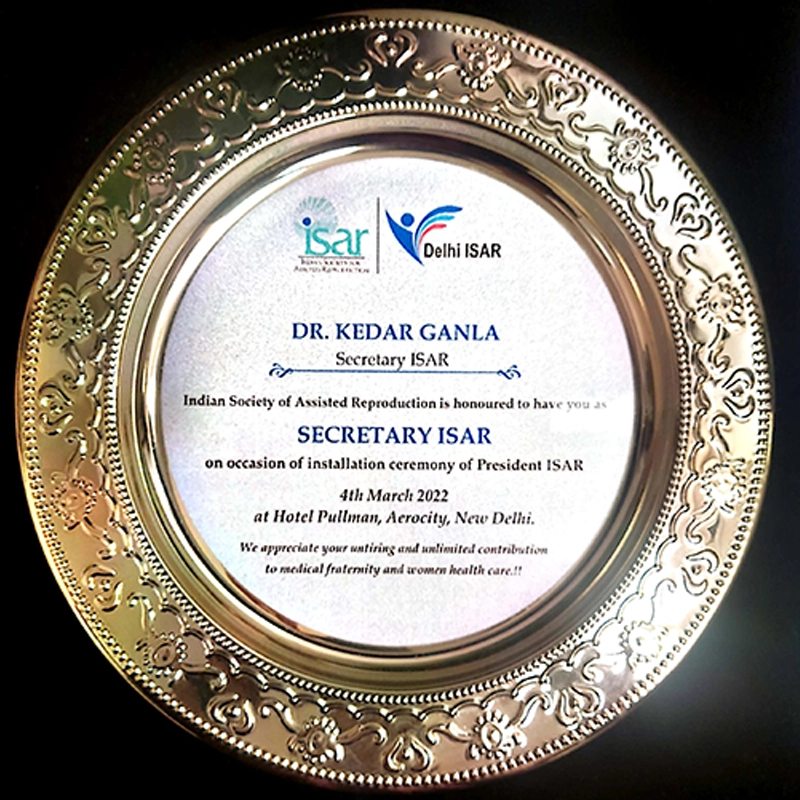
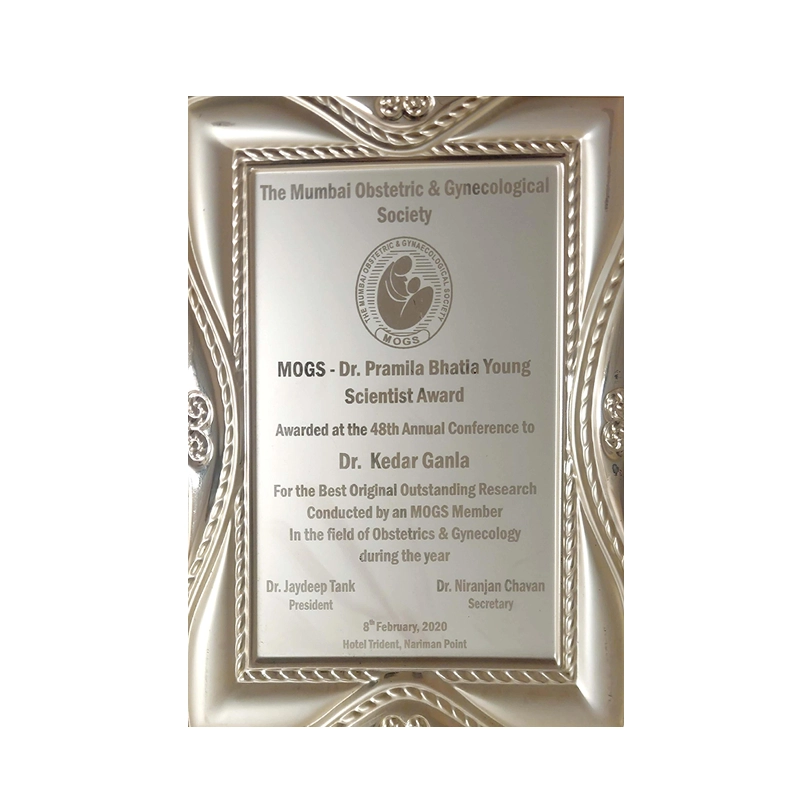
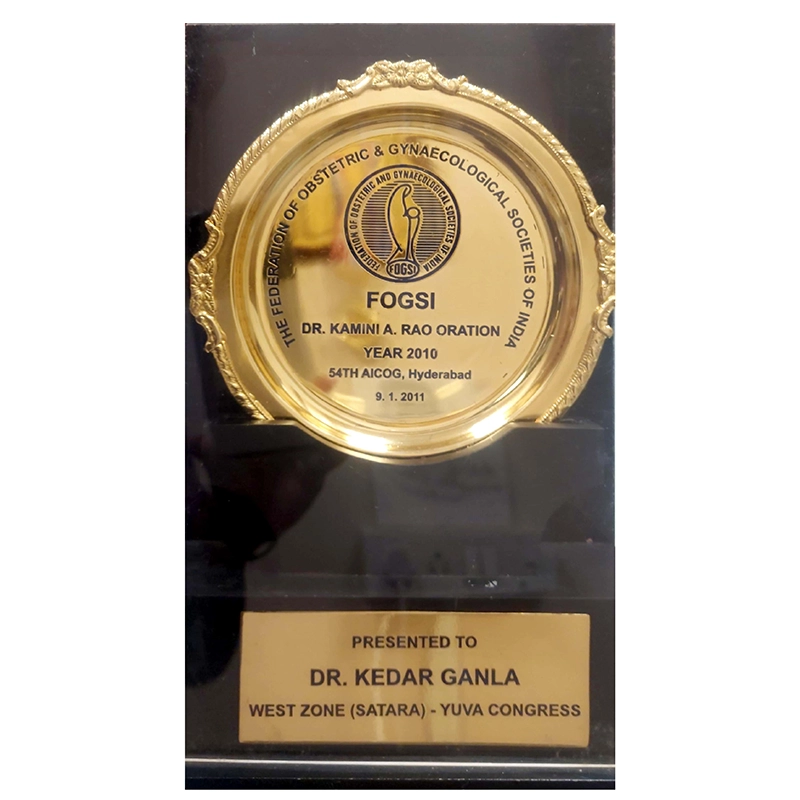
At Ankoor Fertility Clinic, our team of the best IVF doctor in Mumbai provides expert, personalized care, making us the best IVF centre in Mumbai. Our skilled embryologists, nurses, and support staff ensure top-quality treatment, earning us a reputation as one of the best IVF clinics in Mumbai. Our holistic approach includes lifestyle coaches and nutritionists who develop personalized plans for stress management and healthy living. United by a common goal, our dedicated team ensures your journey to parenthood is smooth and successful.



IUI Procedure (Artificial Insemination) is an outpatient procedure, so leaves from office are not required during the monitoring phase.
Only on the day of procedure, half a day leave may be required, since the time from giving semen sample to processing the semen sample and doing the IUI procedure (Artificial Insemination) takes about an hour and a half to two hours.
If done during the morning hours, the busy schedule of the husband can be easily handled by allowing him to leave for his job after giving the semen sample and the initial semen count been checked. The wife could stay back till the procedure is over and resume duty after that.
Also, during the monitoring phase, husband is not required at all visits. However, if time permits he can accompany you.
Generally at “Ankoor Fertility Center, Mumbai”, we perform one IUI Procedure (Artificial Insemination) after confirming the rupture of follicle (release of egg). Usually the follicle ruptures after 36 hrs.of administration of HCG injection. Sometimes two IUIs (Artificial Insemination) are done in a cycle in selected group of patients like previously repeatedly failed IUI’s (Artificial Insemination), male factor infertility, unexplained infertility and when time is a constraint (e.g. The husband is working abroad and has come to India for limited time period) etc.
In our experience by doing two IUI Procedure (Artificial Insemination) for male factor infertility like low sperm count or motility would give a higher pregnancy rates than one IUI Procedure (Artificial Insemination) in a cycle.
These IUIs (Artificial Insemination) are done generally at 24 hours and 48 hours after the HCG injection.
Usually for a perfectly healthy couple trying for pregnancy without any intervention, success rate in any given cycle is only 8 – 10%.
By doing IUI (Artificial Insemination), success rate can be increased upto12%.
In case of failure to conceive in one cycle of IUI, the same treatment and procedure is usually carried ahead by most of the Gynecologists. But we at Ankoor Fertility Clinic go beyond this. Not only is a detailed counseling assured, but also a change in the ovulation induction protocol, a better endometrial evaluation and an approach to increase the male sperm count, improvement in the endometrial blood flow and a better support of the luteal phase, i.e. after ovulation to enhance the success of the treatment in the next cycle.
If oral medications were used for ovulation induction, we use Injectable Gonadotrophins can increase the success rate next cycle.
IUI treatment Cost for the IUI Procedure (Artificial Insemination) depends on the medications used as well as the whether the consultation and folliculometry was also done with us. It also increases if a donor sample is used for IUI Procedure (Artificial Insemination) . The cost at Ankoor Fertility Clinic in Mumbai is around Rs. 5000/-, but it varies between Rs. 2000/- to 10,000/- depending on the above mentioned factors.
This depends on factors like age of the couple, cause for infertility, semen count of the male partner, number of years of infertility, any other associated factors involved etc.
In a young couple, at least 6 cycles of IUI Procedure (Artificial Insemination) with ovulation induction are advised whereas in an elderly couple (age > 35 yrs) 3 cycles of IUI are advised. Also in cases with mild to moderate Endometriosis, it is better to restrict to 3 cycles and then move to higher treatment. Individualization of the cases is done and same parameters cannot be used for all the patients.
A study conducted at Centre for Reproductive Medicine, Department of Obstetrics and Gynaecology, Academic Medical Centre, Room H4-213, Meibergdreef 9, 1105 AZ Amsterdam, The Netherlands stated that as many as 9 IUI Procedure (Artificial Insemination) cycles can be performed but at our centre “Ankoor Fertility Centre, Mumbai” we restrict to 6 cycles as we found that patient returning for further trial and pregnancy rates dropped after initial 6 cycles.Bottom of Form
At Ankoor fertility clinic in Mumbai, we also do Donor IUI. Donor semen is required in cases of severe male infertility with very poor sperm count or very poor motility. It is also done in cases of no sperms in the semen (azoospermia).
We screen the donor for infectious diseases like HIV, HbsAg, HCV (jaundice), VDRL (sexually transmitted diseases) and also the blood group. The donor is also matched physically as per the husband.
IUI (Artificial Insemination) is performed for both male and female cause of infertility as well as in unexplained infertility.
The main reasons where it is used are as follows:
Male Causes
Low sperm count and/ or less number of motile sperms
Anatomic defects of the penis (abnormal structure of penis) leading to failure of deposition of sperm correctly
Sexual or ejaculatory dysfunction (problems related to having sexual intercourse or release of sperms in the vagina)
Low sperm count and/ or less number of motile sperms
Anatomic defects of the penis (abnormal structure of penis) leading to failure of deposition of sperm correctly
Sexual or ejaculatory dysfunction (problems related to having sexual intercourse or release of sperms in the vagina)
Retrograde ejaculation (occurs when semen, which would normally be ejaculated out via the urethra outside, is redirected back into the urinary bladder)
Immunological (presence of antibodies to sperm)
Increased viscosity (thick semen- does not liquefy easily to release the sperms)
Cervical factors- Thick cervical mucus preventing the sperms to reach the uterine cavity. There are also sometimes antisperm antibodies (a protein that attacks and destroys the sperm) in cervix which are harmful to the sperms and prevent fertilization.
Ovulatory dysfunction – No release or delayed or abnormal release of eggs (Oocytes) from the ovaries. Hence ovulation induction using drugs helps in increasing the conception rate.
Minimal endometriosis – Grade 1-2 (presence and growth of the tissue lining the uterus in places other than the uterus e.g., in ovaries, fallopian tubes, intestine)
Psychological and psychogenic sexual dysfunction (Sexual intercourse is not possible)
IUI in Mumbai (Artificial Insemination) has also shown good results in cases of unexplained infertility (No apparent cause found for inability to conceive on routine recommended medical testing) as well.
In some cases where husband is away for many days due to job like military or navy, their semen sample can be frozen and used later. Once the follicle is of appropriate size and has ruptured, IUI (Artificial Insemination) can be performed at the correct time even in his absence. Thus even if the husband is not able to be present on the day of ovulation, husband’s previously frozen semen sample can be processed and insemination can be done.
It takes the same time as a normal menstrual cycle i.e. on an average of four to five weeks from the beginning of menses cycle till the pregnancy test.
First sonography is done on day 2 or day 3 of menses to rule out cyst or any other abnormality. Later on she is put on ovulation induction drugs for 5 to 6 days and called for USG on day 7 or 8. Her USGs are repeated (folliculometry) and the follicles are monitored for growth. Once rupture occurs, IUI (Artificial Insemination) procedure is done. This generally happens around 14 to 16 day of cycle. After IUI (Artificial Insemination) procedure some medicines are given for support for another 14 days.
There is generally no risk in performing IUI treatment for both the husband and the wife. It is one of the safest procedures. There may be a small chance of multiple pregnancies as sometimes more than one follicle may develop when ovulation inducing drugs are used.
IUI treatment (Artificial Insemination) can be done in natural unstimulated cycle or in a stimulated cycle (using oral drugs/injections).
In a natural cycle, with menses coming every 28 days, ovulation, i.e., release of the egg after follicle rupture, happens around 14 days before the next menses. IUI treatment (Artificial Insemination) in a natural cycle is done after the rupture of the follicle is confirmed by ultrasonography. In women with longer cycles, the days may vary.
When drugs or injections are given for follicular maturation (ovulation induction cycles), IUI (Artificial Insemination) is usually done 36 hours- 48hrs after HCG injection. This injection is given to facilitate release of the egg from the ovary (ovulation and release of ovum).
The egg is usually alive for 24-48 hrs. after ovulation. Sperms are alive for around 48-72 hrs. after they are released into the female genital tract. Thus, if processed / washed semen sample is deposited around this time, the chances of conception are very high.
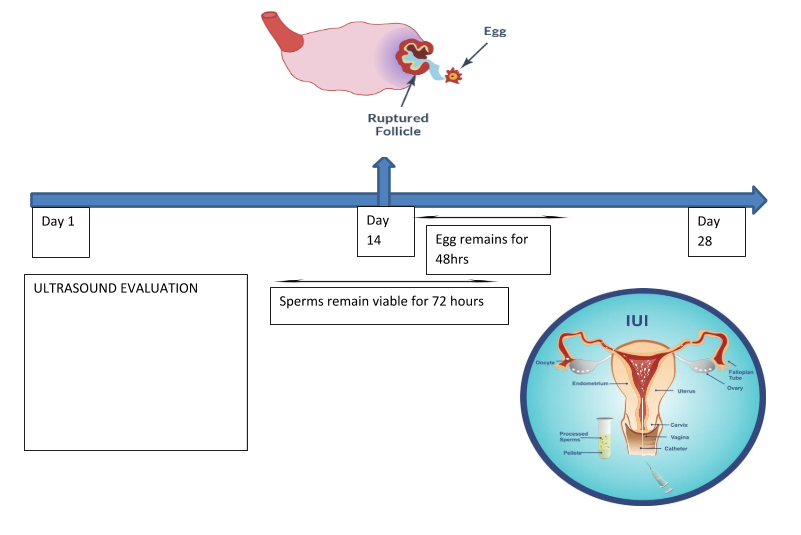
IUI (Artificial Insemination) procedure is the simplest of all procedures. It causes no pain or discomfort.
It is best performed when you are awake. Interacting with the Doctor/ Fertility physician performing the IUI (Artificial Insemination) procedure will not give you the time to realize as to when the IUI (Artificial Insemination) procedure got over.
So the need for Anesthesia in IUI (Artificial Insemination) procedure never arises.
In patients with severe anxiety or severe female sexual dysfunction sometimes there may be need of Anesthesia.
IUI (Artificial Insemination) is a very basic procedure. No anesthesia or pre-medication is required. So, fasting is not required. In fact a light snack before the procedure may help.
In a natural cycle, on the second day of menses, a sonography is done to rule out any ovarian cysts (FLUID FILLED swelling in the ovary). A repeat sonography is done on 8th/9th day of the cycle.
Depending on the size of the follicles in the ovary, further scans are done on daily basis or on alternate days. When the follicle in the ovary (which contains the female egg) reaches optimum size (around 18-20mm), sonography is done every day to identify the exact day of ovulation (release of egg) and the IUI(Artificial Insemination) procedure is done either on the same day or the next day.
In a stimulated cycle, we induce ovulation by using medicines such as clomiphene citrate or N-clomiphene or injections such as gonadotropins (hMG, FSH).
It is generally given from 2nd/3rdday of menses for 5 days.
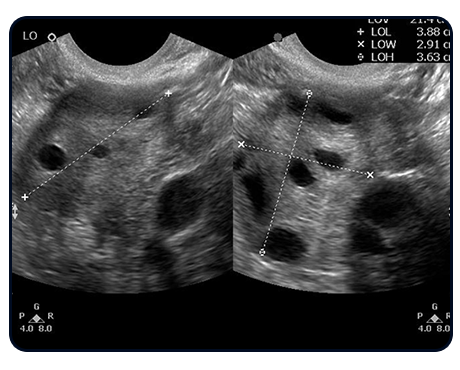
A repeat sonography is done on 8th/9th day of the cycle. Depending on the size of the follicle in the ovary further scans are done on daily basis or on alternate days.
The monitoring of the cycle is done as above. When the follicle reaches around 18-20mm in size, hCG injection is given (hCG trigger). The IUI treatment(Artificial Insemination) is generally done 36 hrs after hCG injection and after confirmation of ovulation (release of the egg).
Below is the picture is of an ultrasound image of the follicle of 18 to 20 mm at which time hCG trigger (hCG injection) is given for rupture of follicle (ovulation).
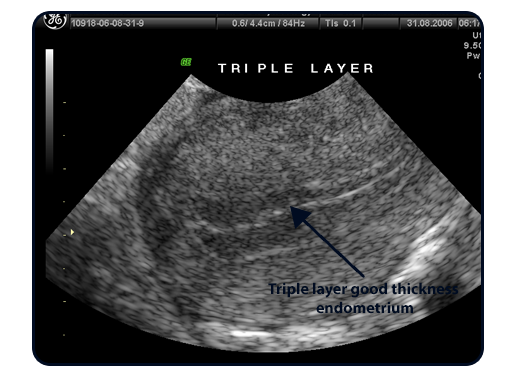
It has been found that stimulation protocols yield better results as compared to natural cycle. This could be related to the quality of oocyte available for fertilization and better endometrial development (inner lining of the uterus).
What is the Advantage of Having Semen Processing and Insemination under One Roof?
At our best IVF centre in Mumbai, we provide everything from consultation to follicular monitoring, semen collection, preparation and insemination under one roof. This helps us to attain better pregnancy and live birth rates.
Studies have shown that techniques for channelizing the positive energy and reducing stress increases success of IUI treatment (Artificial Insemination) .One such technique is “Acupuncture”. At Ankoor Fertility clinic we also have facilities for Acupuncture by qualified specialists too under the same roof. This can further boost your success chances.

It is a tabletop centrifuge with a temperature controlled chamber specially made for semen sample preparation. It is intended to be used in Andrology (preparation in IUI and IVF labs). It has a graphic LCD display and a dial encoder. The function of a temperature controlled chamber makes this equipment unique the lab. The entire emphasis is to maintain the specimen temperature at 37 *C (to keep the temperature as close to body temperature) and to eliminate any thermal shocks. This advantage prevents any kind of damage to the sperms, thus maintain the quality and motility of the sperms to produce very good result.

The laminar air flow is capable of maintaining a sterile work area even when operated in an uncontrolled environment. This is achieved by the total removal of the airborne droplet nuclei and dust-borne bacteria by unidirectional oriented streamlines of clean air at velocities designed to flush the contaminating particles. This also creates sterile pressure against the intrusion of external contaminants and sweeps out particulates produced by the work process, not allowing them to deviate, let alone settle down. It is used in the IUI treatment lab for air flow that is passed through a hepa filter. The air flow passed through the hepa filter is clear of dust and microorganisms, thus transferring only the sterile air in which we can perform processing.

The microscope is attached with LCD,to show the pre wash & post wash semen count to the couple.

This is used for warming the test tube, sample & medium to maintain the temperature as close as possible to body temperature.
Various types of catheter have been used for IUI in Mumbai (Artificial Insemination). These are known as IUI treatment (Artificial Insemination) catheters. They are easy to use. They were semi-rigid devices that fit the curvature of the uterus & minimize trauma to the cervical crypts, endometrium and uterine walls. They are made of non-toxic material. They carry a small volume from their intrauterine tips with minimal dead space (to minimize backflow). Care is taken so that the tip of the catheter does not touch the fundus of the uterus as it may cause contractions.

A well timed IUI (Artificial Insemination) is the critical key to success of the procedure.
After documenting ovulation, the husband has to give semen sample for IUI treatment (Artificial Insemination). This semen sample is then processed. The processed and washed semen is used for insemination.
The patient is told to lie comfortably in supine position with flexion at her hips. The mouth of uterus (Cervix) is visualized with the help of a speculum (instrument). Irrigate the ectocervix and endocervix with buffer. Place the catheter fully assembled, negotiate the internal os gently and deliver it 1.5-2 cm from the internal os. The semen sample is then injected slowly into the uterine cavity with the help of IUI treatment (Artificial Insemination) catheter over period of 1-2 mins. Remove the catheter slowly after 30 seconds.
After the insemination, the woman is told to remain in the dorsal position for around 10 -15 minutes.
There is no need of prolonged bed rest, head low, pain killers, antispasmodics or antibiotics.
Studies have shown that catheterizing distance of 2 cm from the fundus with infused semen volume of 0.3 ml can significantly improve pregnancy rate in patients undergoing IUI procedure (Artificial Insemination) with the husband’s semen.
What is the Advantage of Having Semen Processing and Insemination under One Roof?
At our best IVF clinics in Mumbai, we provide everything from consultation to follicular monitoring, semen collection, preparation and insemination under one roof. This helps us to attain better pregnancy and live birth rates.
Studies have shown that techniques for channelizing the positive energy and reducing stress increases success of IUI in Mumbai. One such technique is “Acupuncture”. At Ankoor fertility clinic we also have facilities for Acupuncture by qualified specialists too under the same roof. This can further boost your success chances.
IUI treatment (artificial insemination) is a simple, atraumatic procedure that takes a few minutes.
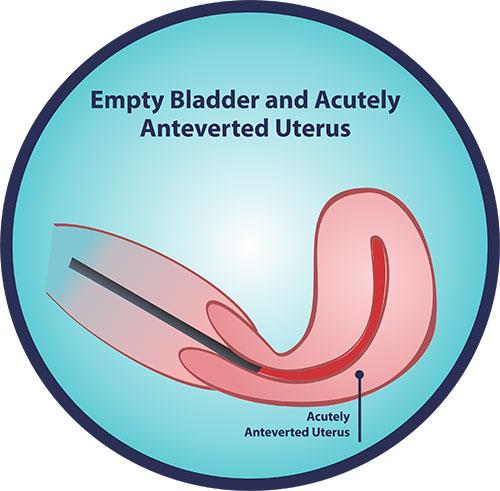
In these cases it is better to have a Full Bladder and or use Allis (instrument) Traction in the opposite direction as shown in the figure below.
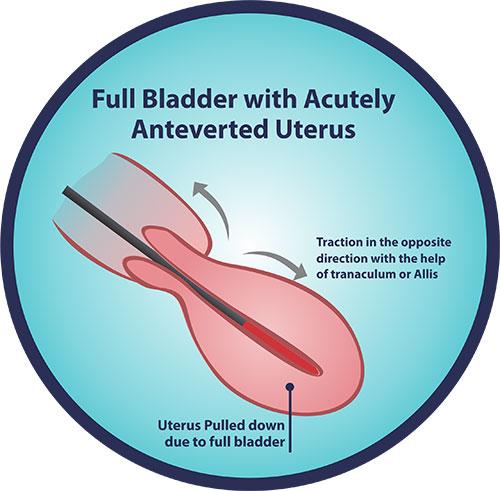
Full Bladder and Acutely Retroverted Uterus.
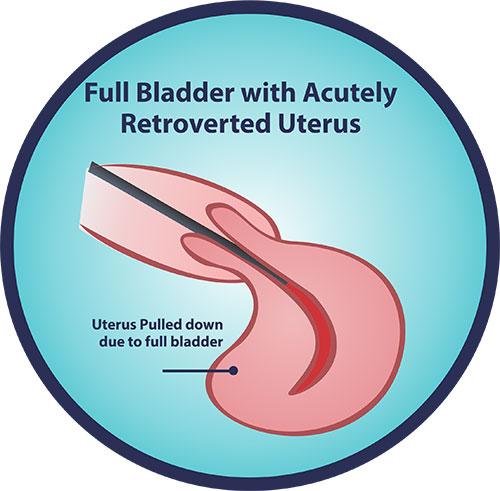
In these cases, patient should empty her bladder and traction should be applied using Allis forceps or tenaculum in the opposite direction as shown in the figure below.
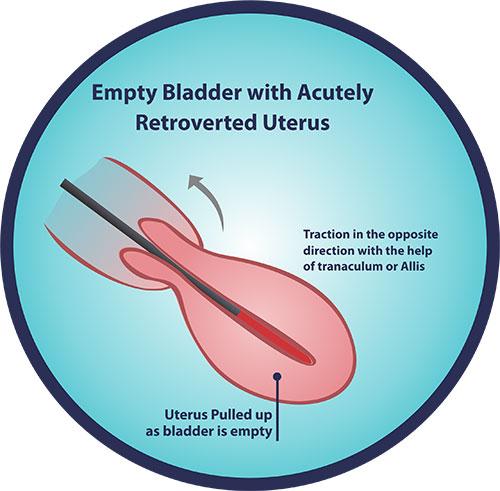
In cases of Difficult IUI Procedure (Artificial Insemination), one must consider cervical dilatation with smallest dilator (helps to identify the direction and also to negotiate the stenosis). Also it is very important to make a note on the paper and consider for Cervical dilatation on the 1st or 2nd day of next menses.
Is Ultrasound-guided IUI Procedure (Artificial insemination)better ?
Studies have shown that Ultrasound-guided IUI (Artificial insemination) does not produce better results than blind insemination, because the pregnancy rate per cycle is similar. (Reference: Hum Reprod. 2009 May;24(5):1080-4. Epub 2009 Feb 5 )
At our best IVF centre in Mumbai, we provide everything from consultation to follicular monitoring, semen collection, preparation and insemination under one roof. This helps us to attain better pregnancy and live birth rates.
Studies have shown that techniques for channelizing the positive energy and reducing stress increases success of IUI treatment (Artificial Insemination) .One such technique is “Acupuncture”. At Ankoor fertility clinic in Mumbai we also have facilities for Acupuncture by qualified specialists too under the same roof. This can further boost your success chances.
High concentration of highly motile, best quality sperms are placed very close to the egg. This increases the chances of conception manifold.
Very simple procedure. No need of anaesthesia.
Patient can go home or to work soon after the procedure.
Extremely useful for couples with sexual dysfunction like dyspareunia, vaginismus, erectile dysfunction, non consummation of marriage, mild male factor infertility, grade I & II Endometriosis, unexplained infertility etc.
Usually husband is not required at all visits.
The pregnancy rates are lower in case of IUI treatment (Artificial Insemination) , approximately 10-15%. During folliculometry we document the release of the egg from the ovary. In the IUI treatment (Artificial Insemination)procedure, we inseminate the active motile sperms into the uterus of the women, however we have no control over the fusion of the egg and the sperm. This explains the low pregnancy rates in case of IUI treatment (Artificial Insemination) .
Apart from the time spent on visiting the doctor, there are no disadvantages of the procedure. IUI treatment Mumbai (Artificial Insemination)is one of the most basic procedures done to enhance fertility. We try and reduce the number of your visits to the clinic, so as to that the work burden on you doesn’t build up.
In most cases, 5-6 visits is all that is required. This includes the day we start ovulation induction, 3-4 follow up visits for follicular growth and a visit on the day of IUI (Artificial Insemination).
It does make sense to try IUI treatment (Artificial Insemination) if you haven’t had success with intercourse with a normal sperm count.
IUI treatment (Artificial Insemination) increases the chance of success with injectable Gonadotrophins no matter what the sperm count is.
With intercourse, only few sperms make it through the cervical mucus and up into the uterus and fallopian tubes. With IUI treatment (Artificial Insemination), significantly more number of sperm will be available for fertilization.
Research has shown that an IUI done just prior to ovulation and repeated again after ovulation increases the conception rate specially in cases of sample with abnormal semen parameters.Therefore, we at Ankoor Fertility clinic, do “double insemination” in such specific cases.
Video of Semen sample with abnormal parameters
Precautions after IUI treatment (Artificial Insemination)
No precaution is the “Best Precaution”.
However, complete mental relaxation is what we want.
Apart from 10 – 15 minutes of lying down immediately after IUI treatment(Artificial Insemination), no additional bed rest is required.
There are no restrictions on travelling as also on mode of travel. You can safely travel by autos, 2 wheelers, local trains, metro etc…etc… It will not change your success rate.
You can safely go to work from the following day.
No restrictions on the food that you eat. One can definitely have papaya, mangoes, veg, non-veg, etc..without changing the success rate.
Medication after IUI treatment (Artificial Insemination)
IUI treatment (Artificial Insemination) is a very simple procedure. To enhance your conception rate, very few medicines need to be taken.
The medications given are generally various progesterone preparations used to support the pregnancy in the luteal phase (the phase of implantation of embryo and continuation of pregnancy after ovulation).
The progesterone preparations may be given in the form of oral drugs or vaginal preparations for insertion in the vagina or a combination of both oral and vaginal preparations.
These medicines are usually started a day after the IUI treatment (Artificial Insemination) .
The vaginal preparations are found to be superior to oral ones as they work locally (in the vicinity) without undergoing the systemic metabolism (absorption into the blood) and also giving higher pregnancy rates.
At Ankoor Fertility Clinic we evaluate the endometrium on Day2 or Day3 and the endometrial blood flow on Day 10 of the cycle. If the blood flow is found adequate and the endometrial lining is good, the likelihood of conception is higher. In cases of deficient endometrial blood flow, medications like Ecosprin, Sildenafil and Arginine are added. Studies have shown these drugs improve the implantation and conception rate. Such a holistic approach gives good results for our patients.
IUI treatment (Artificial Insemination) procedure is usually painless per se. Most women feel a little discomfort similar to internal examination. The actual pain is generally not felt.
It’s more of fear of the procedure that results in pain/discomfort rather than IUI (Artificial Insemination) itself
In 1-2% of patients, there could be abdominal cramps or back pain after IUI treatment (Artificial Insemination), the severity of which is not more than the pain during periods.
Many women also experience ovulation pain which may contribute to the discomfort during IUI (Artificial Insemination) because IUI (Artificial Insemination) is done at the time of ovualtion.
Adequate information regarding the procedure and counseling will reduce the discomfort of the procedure.
Before IUI treatment (Artificial Insemination) we clean the vagina with sterile gauze piece to remove the debris and the natural discharge.
Then we use a sterile medium solution to wash out the vagina before IUI treatment (Artificial Insemination) and make it more receptive to the sperms. This fluid might trickle down to give you a sensation that sperms are coming out.
Also the motile sperms are injected directly into the uterine cavity which is higher up than the vagina and they will swim up as soon as they are injected into the uterus towards the fallopian tubes and not in the vagina. The semen sample is already into the uterine cavity once the catheter is removed. Thus it is normal to have some fluid discharge after the procedure but this does not contain the motile sperms.
IUI treatment (Artificial Insemination) is a simple, atraumatic procedure taking a few minutes.
Generally there is no bleeding after IUI. However, bleeding can happen if the catheter does not enter the cervix (the lower part of uterus) and hence the need to hold the cervix with an instrument called tenaculum arises.
This is called as mild spotting and it stops in 24 hrs. In some patients ovulation itself could be associated with some spotting.
It is absolutely safe to have intercourse soon after IUI (Artificial Insemination).
Infact, we recommend intercourse soon after IUI so as to make sure that the fertile period is completely taken advantage of.
One can freeze the semen sample before an IUI (Artificial Insemination) procedure if they are physically away at the time of procedure.
Once semen sample is given to the lab; a complete semen analysis is performed which includes, volume, liquefaction and viscosity, sperm count, motility, forward progression and morphology.
This semen is then subjected to freeze and can be revived on IUI (Artificial Insemination) day (Freezing can sometimes reduce the motility of the sperms).
Freezing process tends to kill off weaker sperms, and may thus lead to survival of the best sperms.
It does not change the success rate.
It has been documented in the literature that pregnancy has occurred using semen frozen for 21 years.
In normal conditions, the sperm meets the ovum in the fallopian tube around ovulation, the fertilized embryo then travels the entire length of tube and implants in the uterus after around 5-6 days.
The same thing happens after IUI Procedure (Artificial Insemination). Hence bed rest following IUI Procedure (Artificial Insemination) is not required.
This is the time required for fertilized egg to travel from your fallopian tubes to the uterus. This is also the time when lining of uterus will be ready to accept your fertilized egg.
At our centre, we do Color Doppler assessment of the Endometrial blood flow. If the blood flow is good, the receptivity of the endometrium for fertilized embryo is good. If the blood flow is inadequate, we at our centre, provide necessary treatment to improve the blood flow of the endometrium either in the same cycle or the next to increase the pregnancy rates.
VIDEO SHOWING GOOD ENDOMETRIAL BLOOD FLOW ON USG COLOUR DOPPLER
Good Endometrial blood flow at the time of ovulation
Post ovulatory good endometrial blood flow
Post IUI Procedure (Artificial Insemination) the medication for luteal support (2nd half of the cycle)is given for 14 days.
After stopping the medications, you need to wait for 5 days.
If you don’t get your periods after that then you have to come for a checkup to “Ankoor Fertility center, Mumbai” to confirm pregnancy.
If within 5 days after stopping the medicines you get your periods, you have to come and see us on the second or third day of periods.
If pregnancy occurs, there is release of hormone β HCG from the developing embryo. Serum levels of this hormone are measured to detect pregnancy. This hormone is also secreted in urine.
Pregnancy can be detected earliest around 14 days after IUI Procedure (Artificial Insemination).
A simple urine pregnancy test done at home will tell you about your pregnancy.
If in doubt, blood test for hormone βHCG levels can confirm the same.
Mode of delivery i.e. normal delivery or cesarean section is not decided by the way you achieve pregnancy. In the absence of any risk factors, you can safely have a normal delivery.